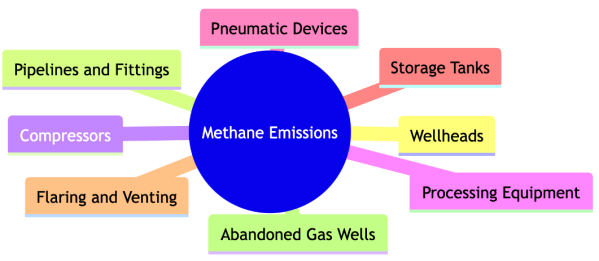CleanTechnica is an American website dedicated to aggregating news about energy, particularly sustainable sources. In July 2023, it published Methane Is A Big Greenhouse Gas Problem & We Leak A Lot Of It Before It Gets Anywhere Near End Uses.
Written by technology strategist Michael Barnard, the article has a subheading:
So many different places where a bad greenhouse gas can leak in natural gas systems. So little incentive for the industry to fix it.


Barnard makes a number of points worth emphasis.
- Every fossil-fuel exporting country in the world doesn’t have its exported fossil fuels counted in its national contributions to climate change. Canada is actually 2% of the global problem if oil, gas, and coal exports are added, but instead, it’s the countries which burn them that get the hit. This makes Canada, Norway, and Australia, for example, look much less like the problems they are.
- Let’s start with wellheads. Do they leak? Why, yes they do. Regulators determine how often wellheads must be inspected, with British Columbia, as an example, requiring at least annual inspections. That means any of leakage at the wellhead might easily persist for a year in a well-regulated region. But that’s for wells that are active and owned and operated by a firm that’s still in business. A very large number of natural gas wells are shut down, and a lot of them are abandoned.
- Fracked wells leak a lot more methane than conventional wells. 3.7% of the extracted natural gas is leaking in the Permian Basin, well above the 1.9% assumed by the EPA, and far above what Europe considers remotely reasonable,
- Processing starts at the wellhead in many cases, or is centralized in regions. More methane leakage occurs in processing equipment. There are a wide variety of compressors throughout the natural gas system. A lot of them burn natural gas from the wellhead or pipeline to power their processes because that’s convenient and cheap for the operators.
- Every compressor includes fittings that can leak, every compressor that burns natural gas is both an opportunity for methane leakage, and every compressor that burns natural gas or diesel is emitting carbon dioxide that is part of the carbon debt of natural gas. All tanks, reserves, and associated equipment are potential sources of methane leakage.
- And a bunch of things in the natural gas upstream industry need little bits of work done here and there, like gauges with needles. Every one of those devices is a potential source of emissions as well and should be counted.
- Pipelines aren’t just steel tubes running through or above the earth. They are sections that are linked together. They are tubes with points where additional compressors come into play. They are voids with sensors that penetrate the walls. They are steel that rusts and leaks. There are lots of opportunities for methane to wander off into the atmosphere and do bad things.
- And then there’s regular maintenance, where pipeline operators usually just vent whatever’s in them to the atmosphere, meaning more methane emissions that are completely avoidable.
- Finally, we come to flaring and venting. Gas pressures underground and in complex systems of tanks, compressors, and pipelines under different conditions of heat can tend to build up pressure in specific spots. While flaring is more of a problem for oil wells which have unmarketable amounts of natural gas, the entire system of natural gas extraction, processing, and transmission has flare points as well.
The main point of Barnard’s article is that many emissions during production, processing, transmission and consumption are uncounted. That is not an accidental oversight.
Governments responsible for regulation of fossil fuels are also promoters of its production and consumption. British Columbia has committed billions of dollars to encourage liquified fossil gas and has extended subsidies by way of royalty credits worth over $15 billion in today’s dollars.
Government’s commitment to growing the fossil fuel industry is in direct conflict with its duty to protect the public and the environment by providing fair and neutral regulation of a dangerous industry.
Measuring escaping methane would make it impossible to meet political promises of emissions reductions for the oil and gas industry. So, no accurate measurements. Honest and effective industry oversight is not a priority.
As Torrance Coste said on Twitter, “The best political advice I know is to ignore what politicians say and pay attention to what they do.”
I would amend that comment to be:
The best political advice I know is to ignore what politicians say and pay attention to what they do, and what they don’t do.
s
Categories: Climate Change




Government knows and doesn’t care as government’s job is to support those who support the government and Global Warming and climate change can go to hell.
LikeLike
Your opening bullet is the most telling, for me. If the governments of exporting countries were to measure the emissions in Canada, and require the companies to cut them dramatically, all while still encouraging exports, we would just get more green house gases emitted elsewhere, but still into our atmosphere.
Then there is the subsidy that BC is paying to gas exporters by building an otherwise pointless dam at Site C on the Peace River, explicitly for the already heavily subsidized LNG. A dam that will probably produce more green house gases than a similarly sized gas plant.
LikeLike
Yes, but think of all the money some are making. Not you and I, but some.
Have never believed Site C was about energy. Have always thought it was about the sale of water, some day. Doubt if I’ll live long enough to find out, but…….
LikeLike